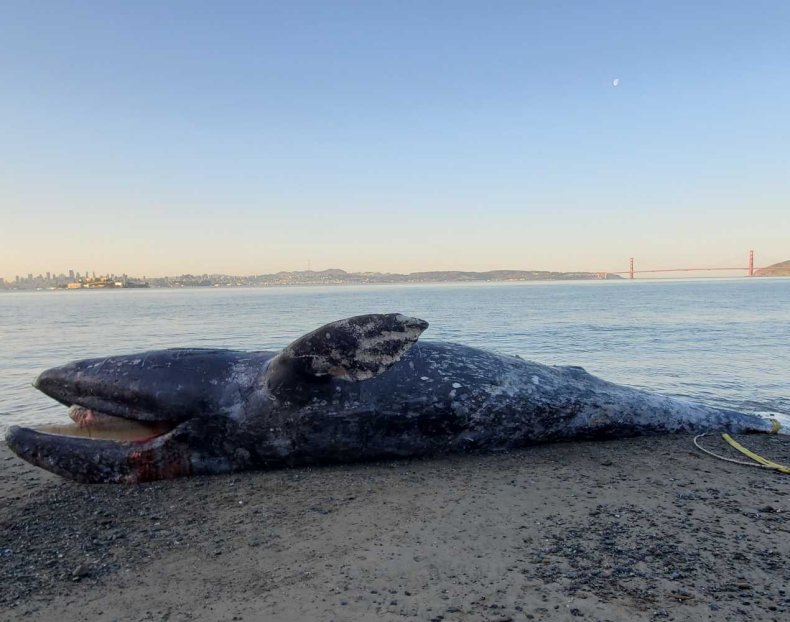Three Gray Whales Found Dead Near San Francisco Bay in a Single Week
Marine scientists in California are investigating after three gray whales were found dead around the San Francisco Bay area in the past week.
Experts from the Sausalito-based Marine Mammal Center, which researches, rescues and rehabilitates sealife, are running necropsie—animal autospies—to determine the cause of deaths of the carcasses. Last week, one came back inconclusive.
Officials who are monitoring the situation said the remains of a 33-foot male gray whale washed up in the San Francisco Bay on Wednesday this week (April 7).
Last Saturday (April 3), a female gray whale, not fully grown, was found outside the Bay at the Fitzgerald Marine Reserve, approximately 20 miles south of San Francisco. Last Wednesday (March 31), a 41-foot adult female washed up at Crissy Field.
"Both whales found in the Bay were towed to a safe and secure location at Angel Island State Park. Our scientists and partners plan to perform a necropsy on the third [most recent] whale... to investigate why this whale died," the Marine Mammal Center said in a Twitter thread that urged the public to report any further carcass sightings.
Our experts have responded to three deceased gray whales in the past week. The first initially washed up on Crissy Field last Wednesday, the second at Fitzgerald Marine Reserve on Saturday and the third found this week floating in San Francisco Bay.
— The Marine Mammal Center (@TMMC) April 8, 2021
Dr. Pádraig Duignan, the non-profit's Director of Pathology, told local news outlet KTVU marine scientists were "concerned" by the findings over the past seven days.
While it remains unclear what killed the whales, Duignan speculated that they may have been hit by ships or become entangled in material while swimming in the ocean.
Scientists previously said in a media release they were unable to determine a cause of death after analysing the carcass of the whale that washed up at Crissy Field.
During the necropsy on April 1, experts noted it was moderately decomposed based on the quality of the internal organs but appeared in good body condition overall.
The release noted: "The whale also had a full stomach of food material from a recent feeding, and no signs of an underlying illness were discovered.
"Based on this evidence, the Center's pathologists suspect the animal died suddenly, although no blunt-force trauma—such as bruising or fractured bones—that would indicate a ship strike was initially found." It said the team would "revisit the carcass to reexamine skeletal remains in order to completely rule out human interaction."
Duignan said it had been "encouraging" to find the whale in good body condition given a recent rise in deaths of whales that seemed to be suffering from malnutrition.
In 2019, the National Oceanic and Atmospheric Administration (NOAA) had declared an Unusual Mortality Event (UME) due to an increasing amount of gray whale strandings and deaths that were logged along the entire west coast of North America.
The first reported stranding in the U.S. for the event was January 15, 2019, the agency said, noting in a fact-sheet that several of the dead whales were "emaciated."
The Marine Mammal Center media release last week said that increased numbers of the gray whales have since been sighted in the San Francisco Bay "as the population continues their northerly migration to cool, food-rich Arctic waters."
For now, it's still too early to say if the three cases have a common link. As Duignan told KTVU: "It may be that we don't see any more in the next few weeks but it also could be we could have more. And if we do have more it will put us in the ballpark of 2019."


